投稿

At the Shareholders’ and Board of Directors’ Meetings held today, Mr. Takuji Nakai was officially appointed as President & CEO.
Mr. Nakai previously served as Representative Director, President and CEO of OCEAN NETWORK EXPRESS (JAPAN) LTD. until March 2024, bringing with him extensive leadership experience in the global logistics industry.
Mr. Shinya Hitomi, the outgoing President & CEO, retired from his position effective June 26, 2025, and will assume the role of Director and Vice President of NYK Energy Ocean Corporation effective June 27, 2025.
We express our sincere gratitude to Mr. Hitomi for his dedicated service and leadership, and we warmly welcome Mr. Nakai as he takes on this important role.
There were some articles in the media, regarding Honmoku Pier D4 Terminal at Yokohama Port.
These articles are not based on our announcement.
What was reported has no basis ground at all.
On May 5th, 2021, World Bank and IHS Markit reported that Port of Yokohama is at the top spot in the new global CPPI (Container Port Productivity Index).
According to the report, CPPI is an index describing the performance of a container port, its score calculated based on data such as vessel position (AIS), size of the vessel for the economic impact, efficiency of container handling, total time spent in the port including the waiting time when entering the port to the departure from the berth, making the efficiency ranking comparable around the globe.
There is a large disparity observed in global port efficiency, such as minutes per container move, where in top performing ports like Yokohama takes only 1.1 minutes in average while some other ports take more than three times that at 3.6 minutes, and this CPPI is developed to enable measuring and comparing the efficiency of container ports, which are all different in size and scale, based on a common standardized method.
Message from Shinya Hitomi, president & CEO
【More detail about the report】
https://www.worldbank.org/en/news/press-release/2021/05/05/asian-ports-dominate-global-container-port-performance-index
At our Board of Directors’ Meeting held today, Mr. Masamichi MOROOKA’s retirement as President & CEO on January 31, 2021 was formally announced. His retirement from the board of directors will become official upon approval by the Extraordinary General Meeting scheduled on December 25, 2020.
His successor will be Mr. Shinya HITOMI, who is Executive Director of NYK Line until end of this month. He will take the position of President & CEO from February 1, 2021.
In celebrating the 160th anniversary of the port, Yokohama Kawasaki International Port Corporation(YKIP) organized Yokohama Maritime Forum(YMF) 2019 on October 23-24, 2019.
YMF2019 was to provide a platform to initiate discussions and inspire ideas among the world’s industries, with a focus on sustainability, diversity and harmonization of port and maritime industries which are critical components of our global future.
Highly respected representatives from the maritime industry including vessel owners and operators, port entities, maritime support services, LNG stakeholders, industrial associations, scholars and regulatory groups were invited to YMF2019, and intensive discussions that encompass the various aspects of the industry were made.
One year later, confronting all kinds of inconvenience caused by COVID-19, we would like to recall the memory of YMF2019 by sharing all video clips of the discussions and speeches. Whether you were with us on YMF2019 or not, you are welcome to listen to what those highly respected representatives in our industry have discussed and proposed.
URL: https://www.youtube.com/channel/UCueru1RAr527kEJIeLWKETA
(Program)PDF
(1) Opening Remarks, in celebration of 160th anniversary for Port of Yokohama
(2) Keynote Speech: A New Era for the Ports and Maritime Industry
(3) SESSION 1: Challenges for Maritime Industry
(4) SESSION 2: Empowering Women in Port and Maritime Industries
(5) Special Speech: IMO Regulations from Perspective of Industrial Associations
(6) SESSION 3: IMO Regulations from Perspective of Industrial Associations
(7) Keynote Speech: Digital Eco-system – Collaborating to create the New Order in Ports, Shipping and Supply Chain
(8) SESSION 4: Ports Perspectives
(9) SESSION 5: Clean Ocean and Governance
(10) SESSION 6: LNG as Marine Fuel and its Bunkering
Ecobunker Shipping Co., Ltd., a joint venture company by Sumitomo Corporation, Uyeno Transtech Ltd., Development Bank of Japan Inc. and YKIP, held a Naming & Launching Ceremony for their first vessel “Ecobunker Tokyo Bay”.
She is a multi-bunkering vessel capable of both Ship-to-Ship LNG and VLSFO (very low sulphur fuel oil) bunkering.
We will continue working on outfitting the vessel including installation of equipments and tanks.
YKIP will support Ecobunker Shipping and promote LNG bunkering as well as Tokyo Bay to develop into one of the world’s leading LNG bunkering hubs.
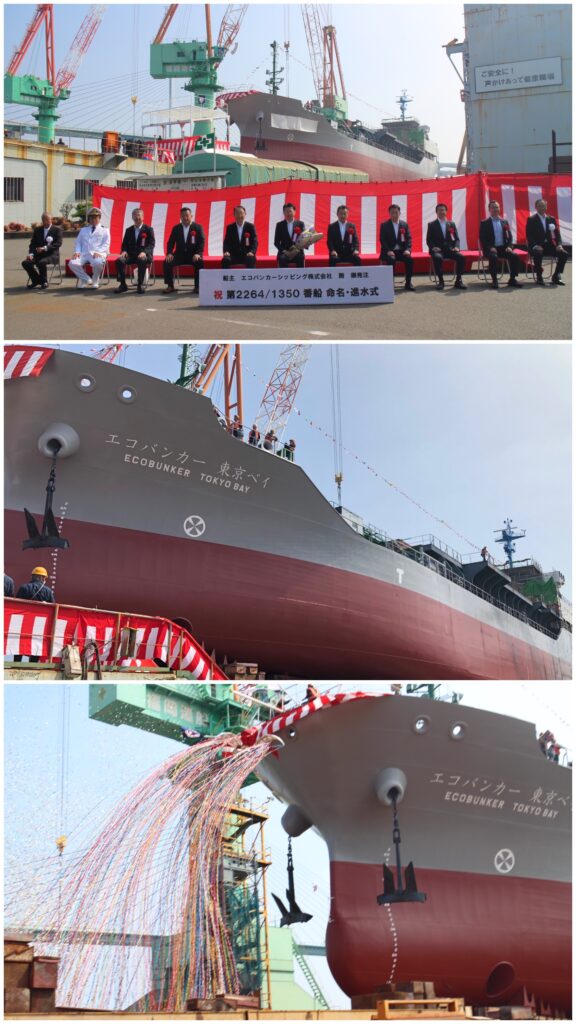
〈The Top Picture〉
Mr. Masamichi Morooka, President & CEO of YKIP (8th from the left), Mr. Kimihiko Endo, Kyusyu District Transport Bureau(6th from the left), Mr. Kiyotaka Yamada, President & CEO of Ecobunker Shipping Co., Ltd (5th from the left)
〈Link〉
Ecobunker Shipping Co., Ltd website
https://ecobunkershipping.com/
May 7, 2020 UPDATE
In order to prevent the spread of the new coronavirus (COVID-19), YOKOHAMA KAWASAKI INTERNATIONAL PORT CORPORATION (YKIP) has decided to implement the Work-from-Home. The detail is as following.
< Office to work-from-home >
Yokohama Kawasaki International Port Corp. (Head office)
Location: Queen’s Tower A 14F, 2-3-1 Minatomirai, Nishi-ku, Yokohama
Period: Monday, April 6, 2020 to Friday, May 29, 2020
*The period will be updated depending on the developing situation.
During the above period, only limited number of employees will remain in the office, communication via email is highly recommended.
We apologize for any inconvenience in advance and appreciate your kind understanding and cooperations.
For any inquiries please contact:
Corporate Planning Department
Corporate Planning Division
Tel: +81 (0) 45-680-6636
Titled as “The Environmental Initiatives at Ports Corresponding to IMO 2020 Global Sulphur Cap and Further Goals”, Sakura Kuma, the Executive Director of YKIP, lectured at International Maritime Law Institute (IMLI) on February 6th, by invitation of Prof. David J. Attard, Director of IMLI.
IMLI, located at Malta, has been an international center for the training of specialists in maritime law under the auspices of the International Maritime Organization since 1988. It also contributes to the development and dissemination of knowledge and expertise in international maritime law, with special reference to the international regulations and procedures for safety and efficiency of shipping and the prevention of marine pollution.
Sakura Kuma received warm welcome from professors, staff as well as students of IMLI. In her lecture, she introduced environmental initiatives of Port of Yokohama, encouraged more cooperation among stakeholders of maritime community, especially emphasized the importance of it between ports and shipping industries.
Among over 40 students from 28 countries, half of them are female. The later part of her lecture extended to the topic of diversity due to the strong interests from the audience.
“I am deeply grateful for this excellent opportunity that kindly offered by IMLI, so that I could have shared some perspectives and knowledge based on my own career. Special thanks to the curiosity and interaction from the students, comparing to the value I brought to the IMLI students, the experience of IMLI was priceless to me.”, Sakura Kuma commented.
During YMF2019 week, YKIP hosted and participated various meetings for Environmental Ship Index (ESI) working group and Clean Marine Fuel(CMF) working group of IAPH. Around 50 people from 12 leading ports of Europe, North America as well as Asia and three other interested organizations joined the meetings from Oct 20-22. Members gathered in Yokohama and deepened the discussions extensively and intensively on environmental approaches from the port perspectives.
It was the first time for IAPH to put the two separate working groups together and seek synergy, Masahiko Furuichi, the Secretary General of IAPH, and Patrick Verhoeven, Managing Director, Policy and Strategy of IAPH both addressed their appreciation to the host, YKIP.
YKIP has been the only working group member representing ports from Asia, it was the first time for YKIP to host such working group meetings. Some members took this opportunity also participated YMF2019 and enjoyed the forum and the beauty of Yokohama.
Session 4: Ports Perspectives
Moderator: Patrick Verhoeven, MD, Policy and Strategy, International Association of Ports and Harbors (IAPH)
Speakers:
Masamichi Morooka, President & CEO, Yokohama-Kawasaki International Port Corporation (YKIP)
Duncan Wilson, Vice President, Environment, Community and Government Affairs, Port of Vancouver
Peter Alkema, Policy Advisor, Port of Amsterdam, Chair of the International Association of Ports and Harbors (IAPH) CMF Working Group
Sam Ruda, Director of the Port Authority of NY & NJ
Session 4 focused on policy making in pursuing sustainability from the perspective of ports. Patrick Verhoeven pointed, “We must invest to promote environmental policies (to achieve sustainable goals),” Sam Ruda claimed, “The arguments are who to make the investments and how much need to be invested?” Patrick Verhoeven further explained, “For example, the trucking industries do not wish to invest more on trucks. They can’t do it without cooperation with other industries. However, seeking for outside cooperation in many cases comes with a counter proposal of cooperation, so it is not easy.”, and hence he claimed for incentives to encourage environmental actions. A voice from the audience argued “what about the penalty on those violations against environment and causes pollution?” while some other responded that the carrot and stick approach such as combination of incentives and regulations might be effective. In addition, the necessity to terminate incentives when all vessels become environmentally friendly was discussed.
Another question regarding the cooperation among the ports was this, “There are many similar environmental protection programs around the world, do we need a single integrated platform instead?” several participants responded positively. In addition, Masamichi Morooka pointed out the following, “Ports and harbors are local entities, we do not have an intergovernmental authority like the International Maritime Organization (IMO). We can utilize some port and harbor networking groups such as the IAPH to enhance communications and cultivate action plans. Events such as Yokohama Maritime Forum (YMF) should be organized effectively in terms of encouraging dialogues among stakeholders such as ship owners/operators, port authorities, terminal operators, etcetera.”
In terms of ensuring LNG bunkering availability and safety, Peter Alkema explained, “Diversify of vessel type is increasing, LNG is becoming a principal marine fuel intermediately and even over a long term.” he also mentioned, “because LNG fuel and other new energies will require high level safety management, a framework that guarantees safety must be established,” he then introduced the Audit Tool which was developed by his working group under IAPH, and share with the audience the ambition of his working group on safety measurement for other future alternative marine fuels based on the previous experience on LNG.”
Masamichi Morooka emphasized that it is essential to build up a network of LNG bunkering available ports instead of flying solo when considering long haul voyages. Duncan Wilson disclosed their endeavors on achieving ship-to-ship LNG bunkering at Port of Vancouver by early 2022, and stated, “Cooperation is the key”.
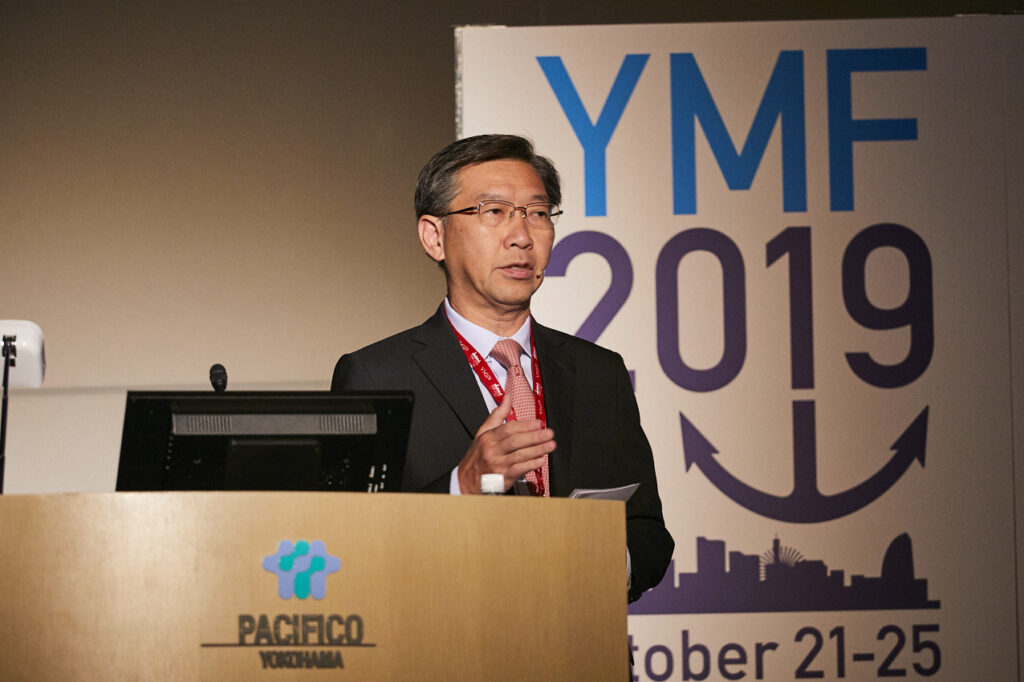
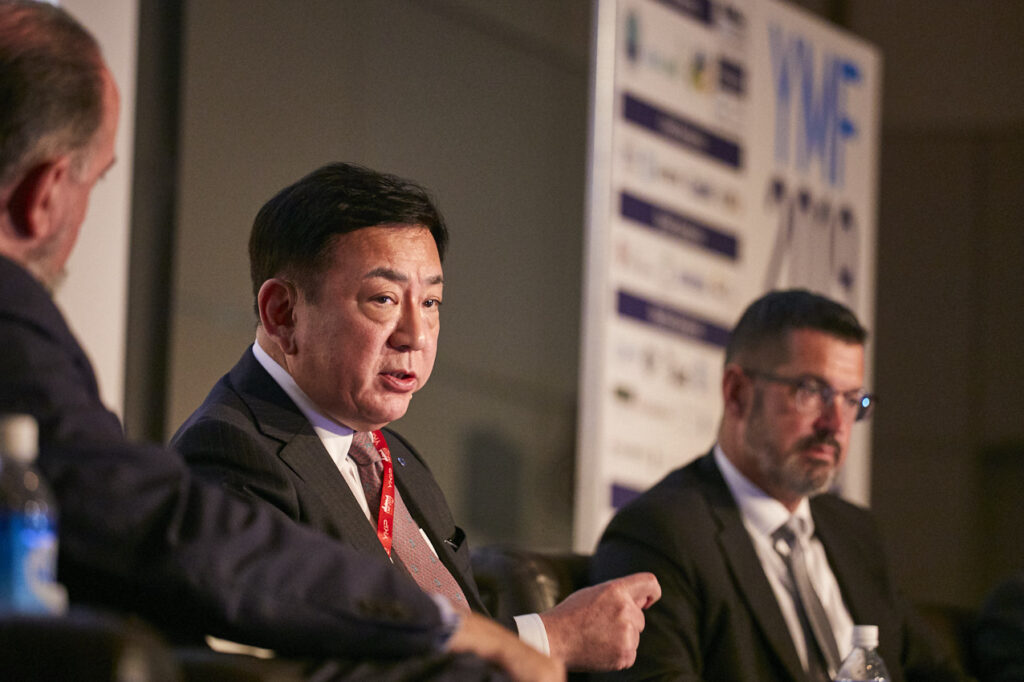
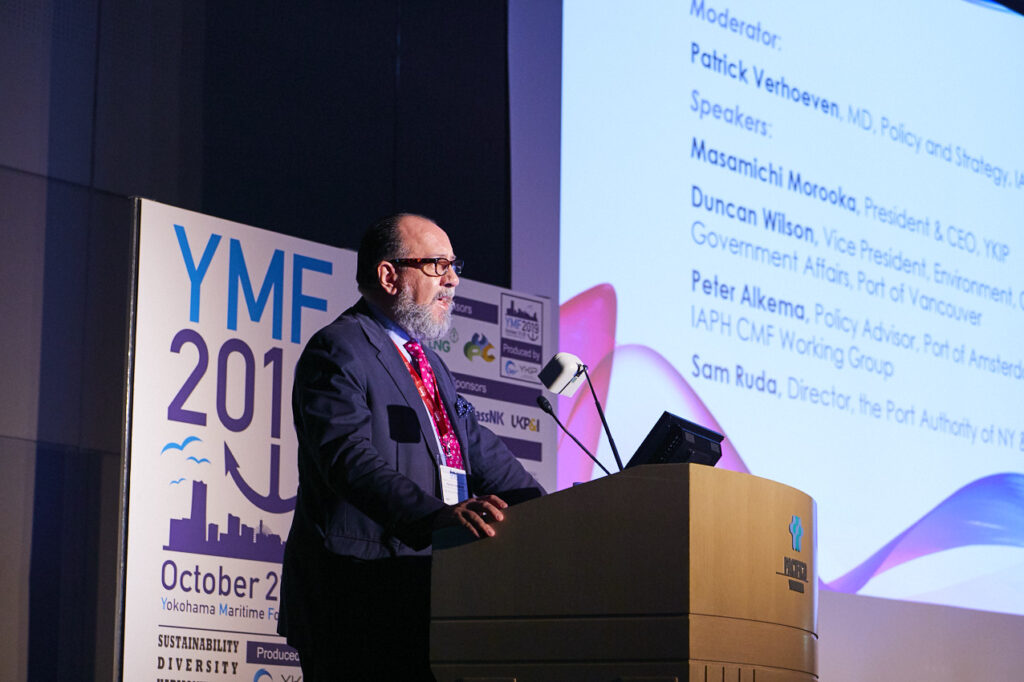
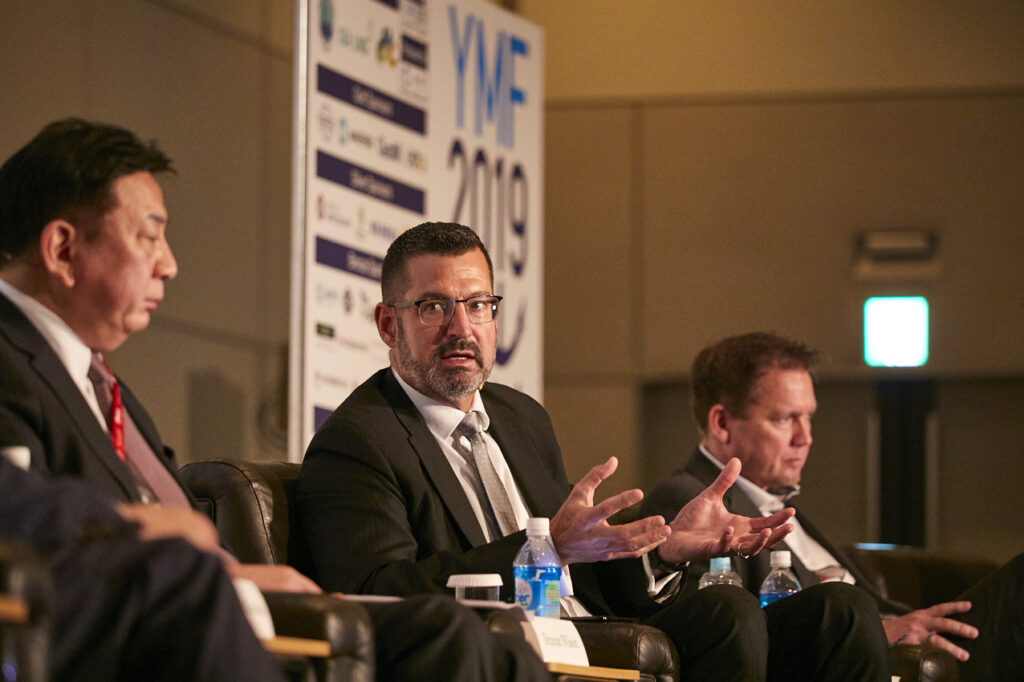
Session 5: Clean Ocean and Governance
Moderator: Paul Holthus, Founding President and CEO, World Ocean Council (WOC)
Speakers:
Katharina Stanzel, Managing Director, International Association of Independent Tanker Owners (INTERTANKO)
Mariko Kawano, Professor, Waseda University, Faculty of Law
Tomoyuki Koyama, Managing Corporate Officer, NYK
Atsuhiko Isobe, Professor, Kyushu University
Paul Taylor, Managing Director, Global Head of LNG Shipping and Offshore, Societe Generale, London
Session 5 focused on the theme, “Clean Ocean and Governance.” Professor Kawano mentioned the United Nations Convention on the Law of the Sea (UNCLOS) that discusses the protection and preservation of the oceans, and claimed, “This convention is important when considering how to utilize and interact with the sea.” Since the 1970s, the necessity for UNCLOS has been increasingly considered globally. Professor Kawano also suggested, “This convention is characterized by respect for existing rules and laws, and under the convention, all countries should promote efforts to protect the marine environment in conformity with its own laws.”
She further explained that it is necessary to consider the protection of fisheries related resources separately from the protection of the general marine environment (as stipulated by the convention).
She also said that protection of the marine environment must be restudied by all citizens both in their childhood and as adults. In response, Paul Holthus stated, “The role of the private sector is also important”.
Tomoyuki Koyama recalled how, on his first voyage as captain, he faced a crisis when he almost collided with another ship in a narrow water way. “I was able to avoid the collision at the last moment, but if my vessel collided with it, it could have caused severe damage which might have been an environmental catastrophe. This experience reminded me to never be overconfident and to be sure that it was understood and cooperated by the entire crew.” He also introduced past large-scale accidents in the marine transport industry that resulted as oil pollution. He reported that the maritime industry has learnt the lessons from those accidents by continually striving to strengthen safety measures and consequently reduced the number of accidents.
Specifically, he cited the case of Exxon Valdez oil spilling in 1989 which led to the switch-over to double-hull tankers. The adoption of double hulls has not only strengthened safety but has resulted in a more than 60% reduction of environmental load since the era of single-hull vessels.
Professor Isobe talked about the problem posed by microplastics floating on the sea with harmful effects on marine life. He introduced efforts by Hokkaido University and many other institutions in Japan to monitor microplastics in the North Atlantic Ocean.
He graphically showed that in the seas of East Asia including those surrounding Japan, the quantity of microplastics is higher than in oceans around the world, and sounded the alarm, “we are in a hot-spot of marine pollution.”
He also explained that research on microplastics has begun in earnest only during the past 10 years, and pointed out as a future challenge that, “We must clarify the state of the circulation of all microplastics throughout the world.”
Next, Paul Taylor introduced Poseidon Principles, which are climate change related principles concerning the financing of the maritime transport industry, and to which his bank is a signatory. Under these principles, many financial institutions including Societe Generale cooperatively evaluate efforts by marine transport companies to meet the GHG (greenhouse gas) emission reduction goals of the IMO (International Maritime Organization). Taylor stated, “Based on the principles, actions to deal with environmental problems will be confirmed in order to determine the contributions of marine transport companies.”
He also stated that according to the principles, “We partner with our customers (in the promotion of environmental measures),” and “We back investment in new fuels such as LNG (liquid natural gas), methane, and hydrogen.”
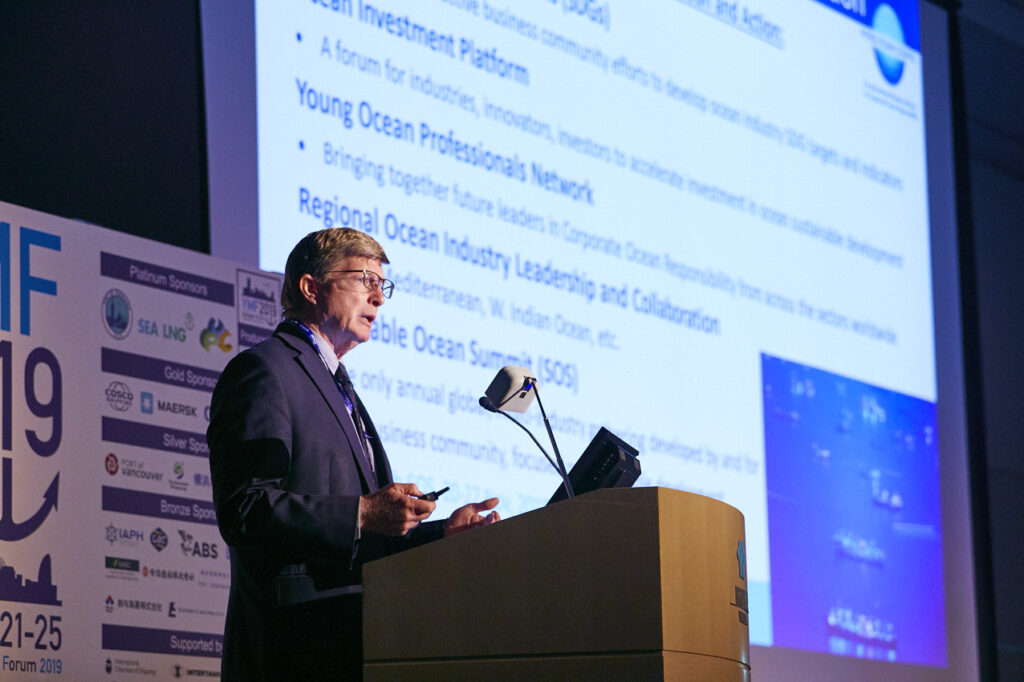
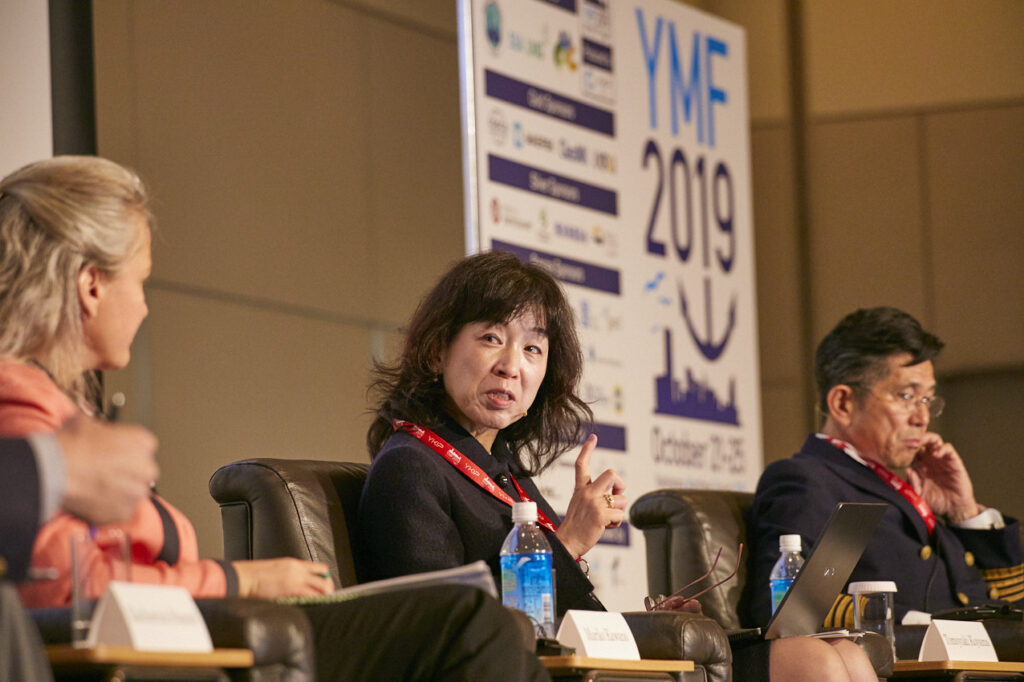
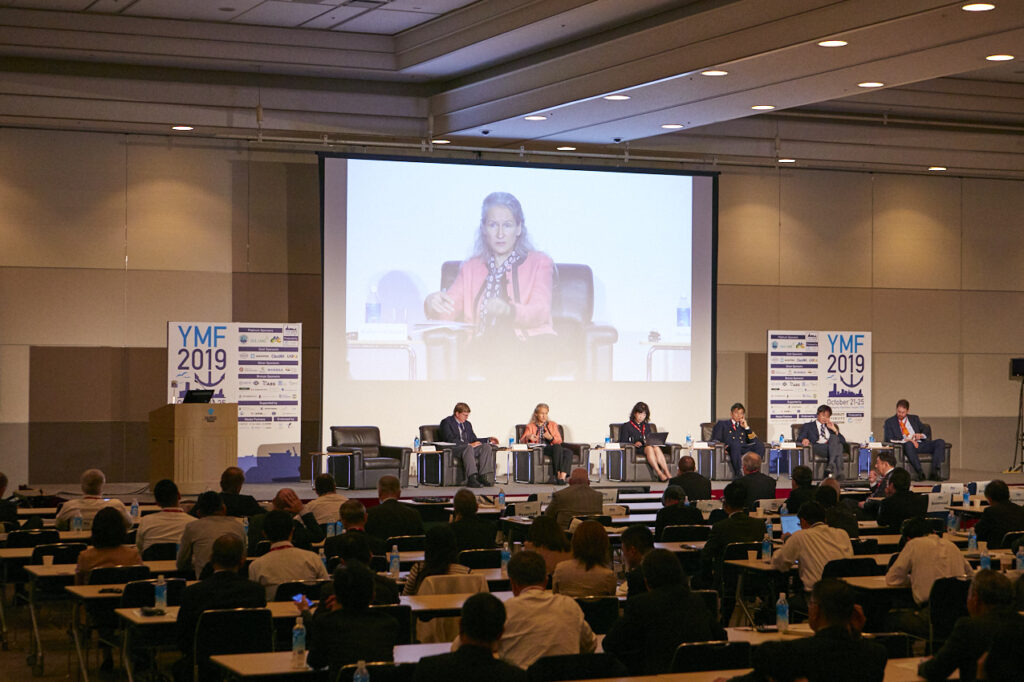
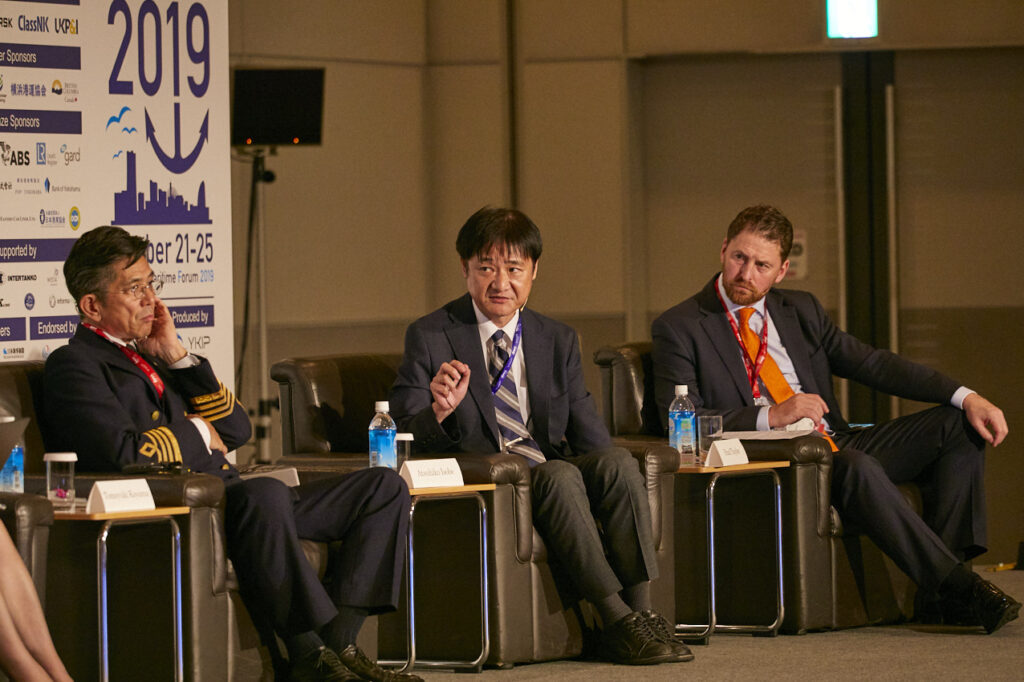
Session 6: LNG as Marine Fuel and its Bunkering
Moderator: Peter Keller, Chairman, SEA∖LNG
Speakers:
Tom Strang, SVP, Carnival Corporation & PLC
Takeshi Hashimoto, Representative Director & Executive Vice President, Mitsui O.S.K. Lines, Ltd.
Capt. M. Segar, Assistance Chief Executive, Maritime and Port Authority of Singapore (MPA)
Takayuki Sasaki, Director, Senior Managing Officer of Offshore & Engineering Division, Japan Marine United Corporation
Svein Steimier, President and CEO, NYK Group Europe
John F. Hatley PE, Americas VP, Wartisila
Session 6 focused on the petential of LNG as a marine fuel and the provision of an LNG bunkering system. Peter Keller stated, “a bridge connecting past fossil fuels to zero carbon state is needed,” and emphasized, “LNG fuel is a promising way to reduce atmospheric pollution.” John Hatley also stated “The use of LNG fuel should begin right away both to earn profits from investment and to impact the environment.”, based on a well-developed SEA\LNG research
Svein Steimier introduced the world’s first LNG fuel automobile transport vessel and the next-generation battery-equipped LNG fuel automobile transport vessel introduced by United European Car Carriers (UECC) which is a joint company formed by Nippon Yusen and Wallenius Wilhelmsen Lines. He expressed his expectation that, “The competitiveness of LNG as marine fuel has already been proven. In the future, more and more ships will be powered by LNG fuel.”
Captain Segar explained, “the Port of Singapore is one of the world’s leading bunkering hubs” and added, “When environmental standards become stricter, it will be necessary to search for clean replacement fuels, but among these, LNG is the most mature and most practical fuel. So, a system permitting the safe and efficient bunkering of LNG must be established.” He also mentioned the ship-to-ship LNG bunkering operation which started this year. In order to achieve the goal of a 50% reduction by 2050 of greenhouse gas (GHG) emissions from their 2008 level, Takayuki Sasaki said, “It is a goal that includes existing vessels, so new vessels must provide even greater emission reduction effects.” He added, “The role of a shipbuilder is to build vessels which are able to perform as demanded (by ship owners/operators), we think LNG fuel is the most effective solution for now.”
Takeshi Hashimoto introduced MOL invested LNG bunkering vessels which will be allocated to Singapore and Rotterdam, and pointed, “LNG fuel will not only reduce emissions of GHG, but also provide superior economic competitiveness, I think.” on the other hand, as challenges, he mentioned the huge financial impact involving the initial investment on infrastructure and equipment such as LNG fueled ship building and the contraction of bunkering systems. He stated, “the initial cost must be reduced in promoting LNG as mainstream of marine fuel, and we must focus on how to overcome this challenge.” Tom Strang stated, “I think that LNG will become the mainstream marine fuel for the next-generation.” and introduced the progress on LNG fueled cruise ship building in Carnival.
A voice from the audience raised, “Why we don’t see LNG fueled vessels in new-built as many as it could be?” Captain Segar and Takayuki Sasaki then responded by mentioning the comparably high initial costs and the un-readiness of bunkering system. Takeshi Hashimoto and Tom Strang explained, “the bunkering availability is increasing maybe slowly but surely, and we have no worries on the LNG supply.”
“we need to persuade shipowners more effectively.”, added by Tom Strang, and “in order to offset the initial cost, subsidies and tax breaks shall be effective at least at the initial stage.”, added by Takeshi Hashimoto.
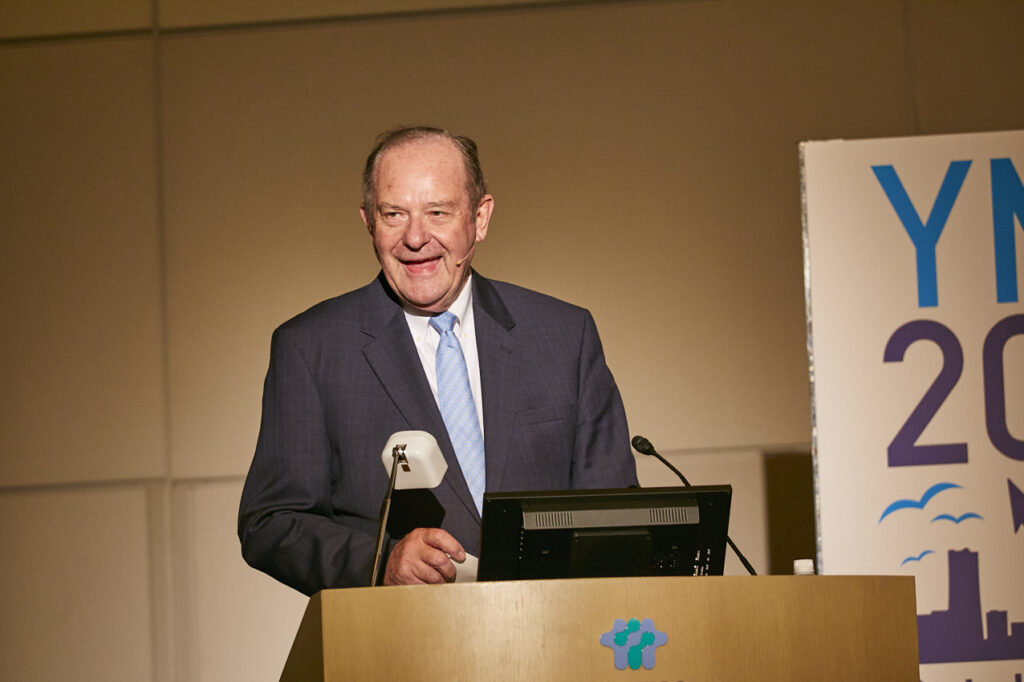
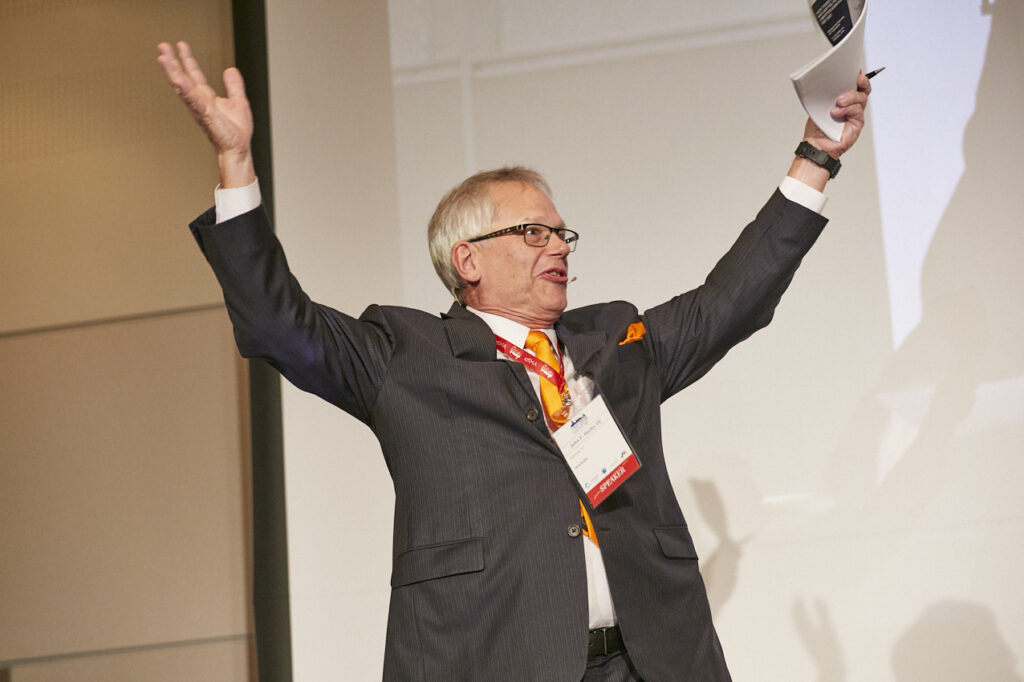
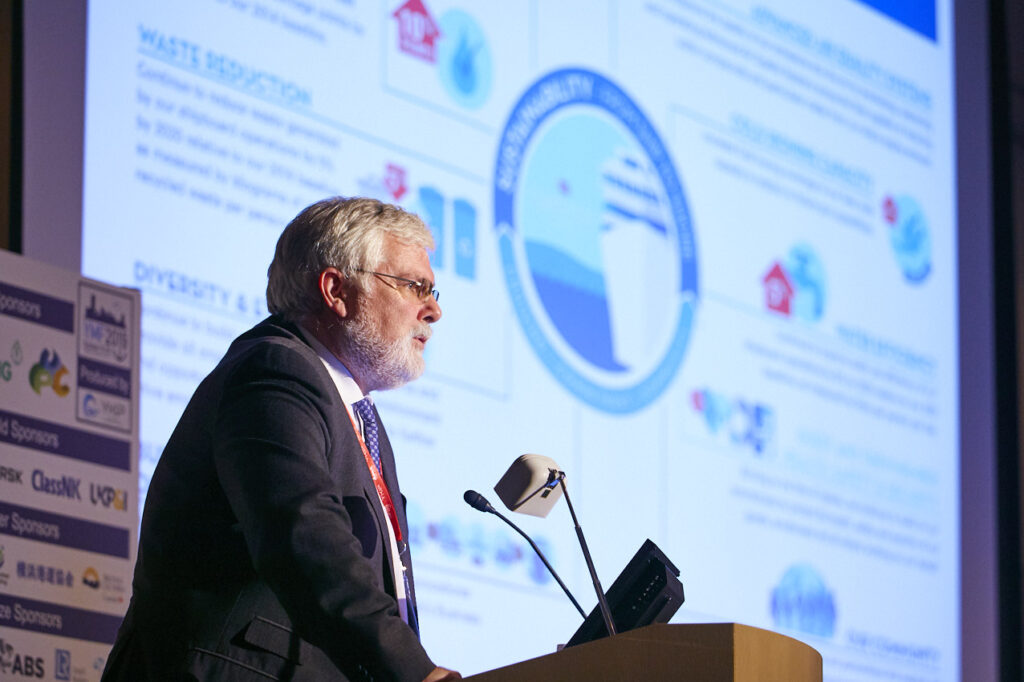
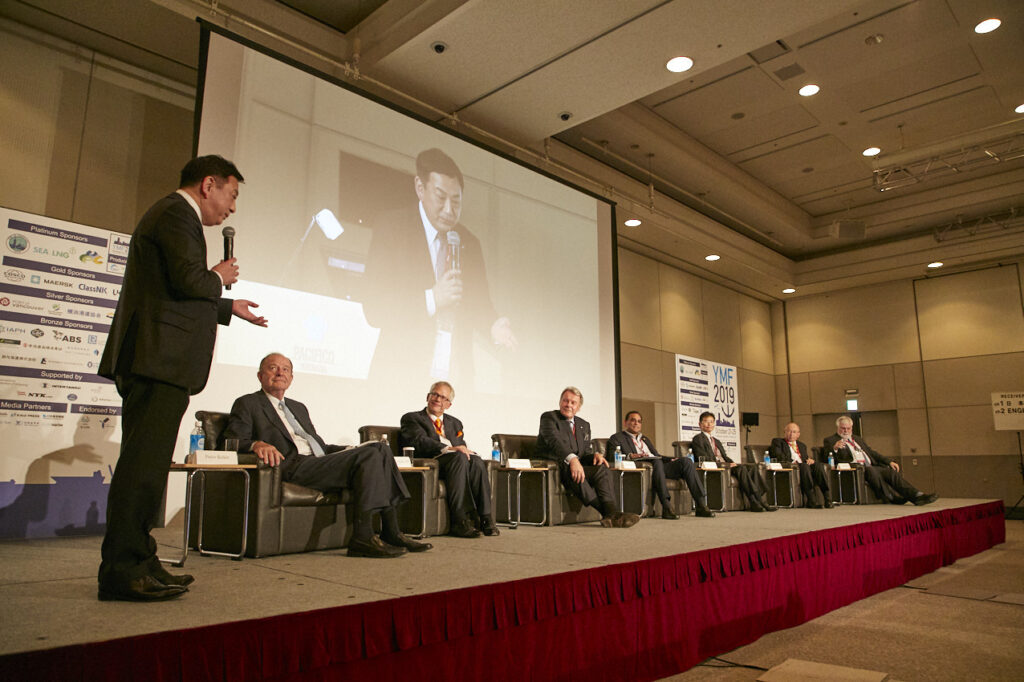
Session 1: Challenges for Maritime Industry
Moderator: Hugo Wynn-Williams, Chairman of Thomas Miller Holdings Ltd
Speakers:
Dr Martin Stopford, Non-executive President of Clarkson Research
Jeremy Nixon, CEO of Ocean Network Express (ONE)
Robert van Trooijen, Senior Vice President, Head of Asia Pacific, A.P. Moller-Maersk
Tom Strang, SVP, Carnival Corporation & PLC
Tadaaki Naito, President, Japanese Shipowners’ Association (JSA)
Session 1 was opened with speeches by Jeremy Nixon, CEO of ONE, and Tadaaki Naito, President of JSA. Nixon explained this year’s container trade situation as a slow-down from the lively year of 2018 under the effects of a prolonged U.S.- China trade war. He also stated that main point of SOx regulations that will begin next year is a switch-over from heavy fuel oil to very low sulfur fuel oil (LSFO), but the difference in their price will be a challenge for the industry.
Naito explained environmental efforts made by the JSA, and also revealed two case studies as NYK Line: a proving test of the world’s first autonomous surface ship and the seaman’s electronic currency MarCoPay, both introduced by NYK.
During the panel discussion, referring to reducing cruising speed as a means to reducing carbon emissions that Non-executive President Dr. Martin Stopford mentioned in the keynote speech he gave before the session, Nixon explained that substantial progress has been achieved in this endeavor over the situation in the 1980s and 1990s. He also stated that in the container shipping industry, frequency fell temporarily as a consequence of large-volume shipments resulting from enlargement of vessel sizes and alliance concentration, but in the logistics industry, the rise of Amazon etc. resulted in a decline of individual shipment sizes but a rise in their frequency and other counter-trends, and the present challenge is how to bridge the gap between the two industries.
Trooijen, Senior Vice President of Maersk also stressed that it is vital to slow cruising speeds and revolutionize technologies in order to achieve decarbonization. New ships with innovative technologies must be introduced to reduce carbon emissions. On this topic, Strang, Carnival’s SVP stressed that because if cruise passensers are conscious that the cruise industry is not taking environmental measures, this awareness will severely impact its business, the industry must tackle environmental issued driven by a sense of crisis. Carnival has 20 passenger ships on order, but he explained that 10 of these will be extremely environment-friendly vessels, including those powered by LNG fuel. He also expressed the view that the container vessel industry must also push ahead with such measures if its clients increase their pressure on them to decarbonize.
Naito, President of JSA introduced in his capacity as Chairman of NYK a proving test of NYK’s autonomous vessel, reporting that although it had not achieved 100%, future models would reach this goal. Stopford, Non-executive President of Clarkson argued that while he agreed with this, it was vital to standardize detailed items such as cargo control and ballast etc.
On the topic of the IMO’s goal of reducing GHG emissions of ocean-going shipping to half of their 2008 levels by 2050, Nixon made a proposal. “It is necessary for the entire industry to cooperate rather than for companies to act alone. And isn’t it necessary for the industry to act on its own initiative instead of waiting for regulatory authorities?” Stopford also argued that entrepreneurs who create new technologies to achieve decarbonization must appear. Naito stated, “(decarbonization) is the ultimate challenge, but it is important to do all that can possibly be done to reduce GHG.”
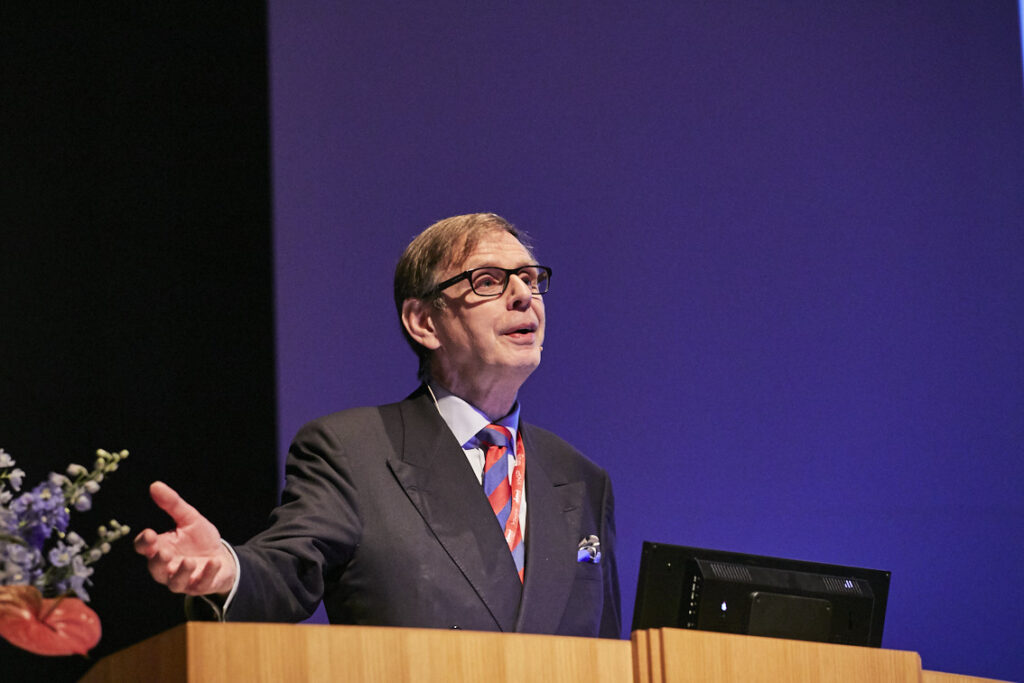
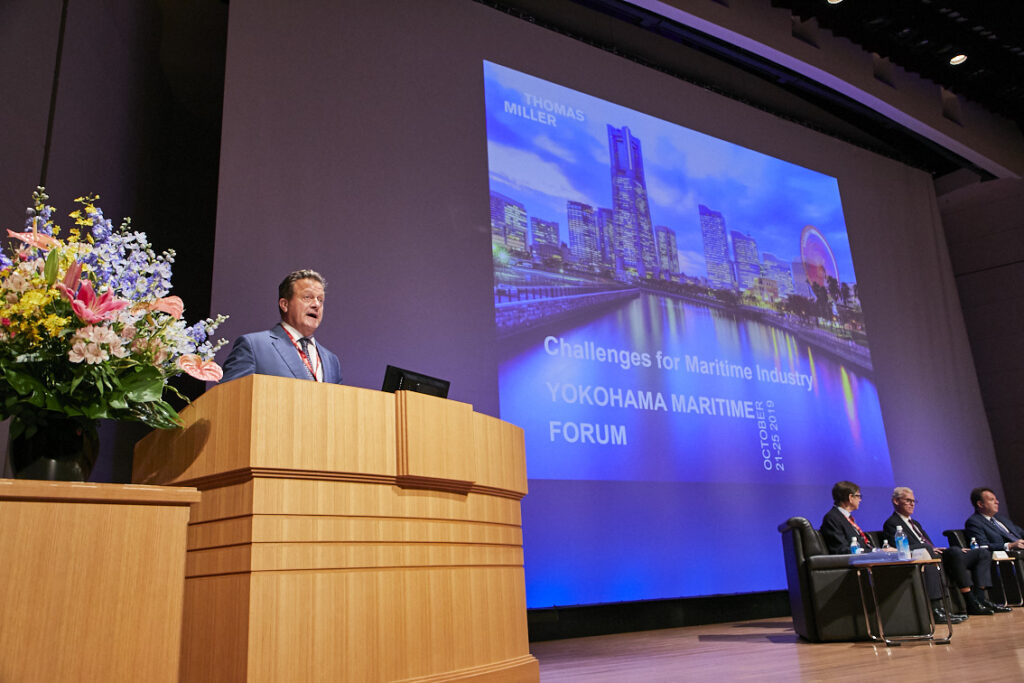
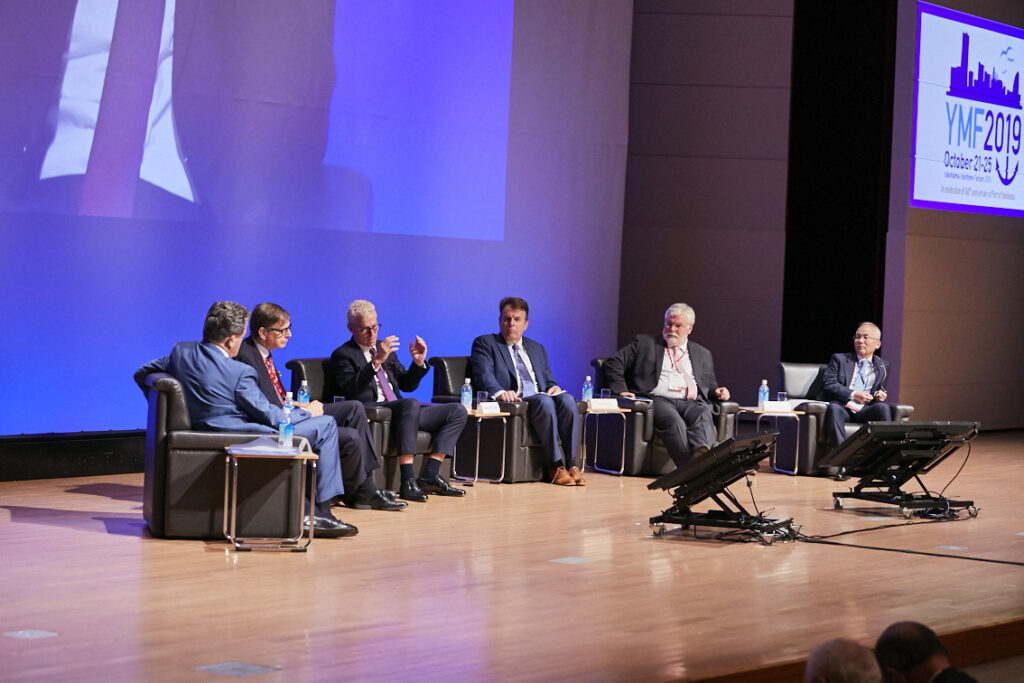
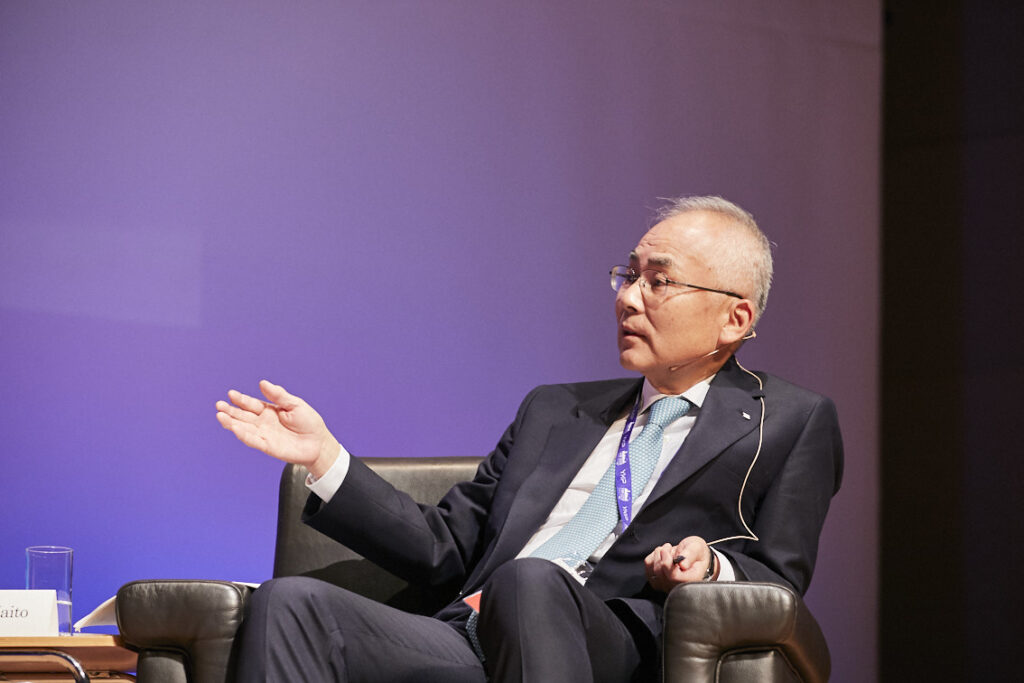
Session 2: Empowering Women in Port and Maritime Industries
Moderator:Katharina Stanzel, Managing Director, INTERTANKO
Speakers:
Despina Panayiotou Theodosiou, International President of Women’s International Shipping and Trading Association (WISTA)
Guy Platten, Secretary General, International Chamber of Shipping (ICS)
Akiko Yoshida, Director-General of Kanto District Transport Bureau, MLIT
Sakura Kuma, Executive Director, and Head of Marketing & Sales, Yokohama-Kawasaki International Port Corporation (YKIP)
Before Session 2, Despina Theodosiou, President of WISTA presented her keynote speech. She pointed out that, “in the midst of a major transformation of the shipping industry’s environment through digitalization and other changes, we absolutely have to incorporate new diverse ideas” and emphasized that women must advance in the industry. On the topic of concrete efforts, she stated, “The shipping industry must be more attractive at the same time as ships and working environments that welcome women must be created.”
During the panel discussion, Stanzel, Managing Director of INTERTANKO pointed out that, “In order to make equality of men and women a reality, it will be essential to eliminate traditional unconscious gender prejudice.” Talking about the present situation in the shipping industry she stated, “The percentage of women is not high, but taking advantage of the views and ways of thinking of women will result in increased profitability.” Kuma, Executive Director of YKIP drew on her own experience to state that “There are few women in the port sector, but men treat them cordially, so we do not feel isolated.” On the other hand, she presented specific episodes while explaining that “men and women are not equal in society,” and emphasized that, “in the future, men and women must be equal.” Yoshida, Director-General of MLIT reported that Japan was ranked at the low level of 110th in a gender-gap ranking announced by the 2018 World Economic Forum, and stated, “Few women are given decision-making positions in particular. Women’s role in the home that is considered to be traditional and prejudicial view of women’s abilities remain.” Regarding the promotion of women to executive posts, she argued, “Instead of excessively anticipating women’s views and ways of thinking in decision-making, we should adopt the approach that (women’s advance) will draw attention to views which have been hidden until now.” Platten, Secretary-General of ICS took up the significance of promoting the activities of women, explaining, “For example, men tend to take risks while women avoid risk. Taking advantage of their strengths can improve results.” He also stated, “It will be necessary to create attractive work places in order to bring young women into the maritime shipping and port industries.”
International Theodosiou discussed the promotion of the activities of women in companies, stating, “It is necessary to include everyone concerned and discuss issues with an open mind. In addition to the need for role-models (of women working in the industry), it is also important for men to act as mentors.” In response to this statement, Yoshida said, “In administrative bodies, there are few mentor systems, so first mentors must be created. It is important they act as promoters who concretely evaluate the way that women work and their contribution to society in Japan.” On the subject of improving work methods, she stated that “In Japan, the birth-rate is falling and society aging, and in the future, the economy will be poor if women do not achieve progress,” and expressed the view that, “women working should be considered and past work methods including that of men should change. Through the process of review, a technological revolution will probably occur.” Kuma commented, “If automation progresses, transforming working environments, it will also be easier to women to work.”
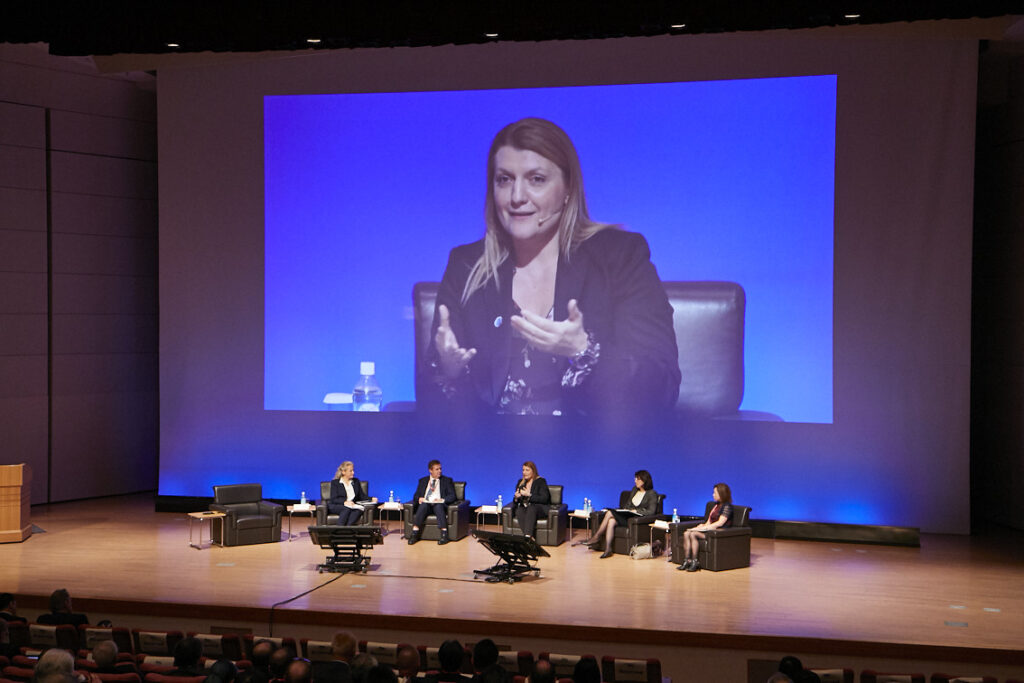
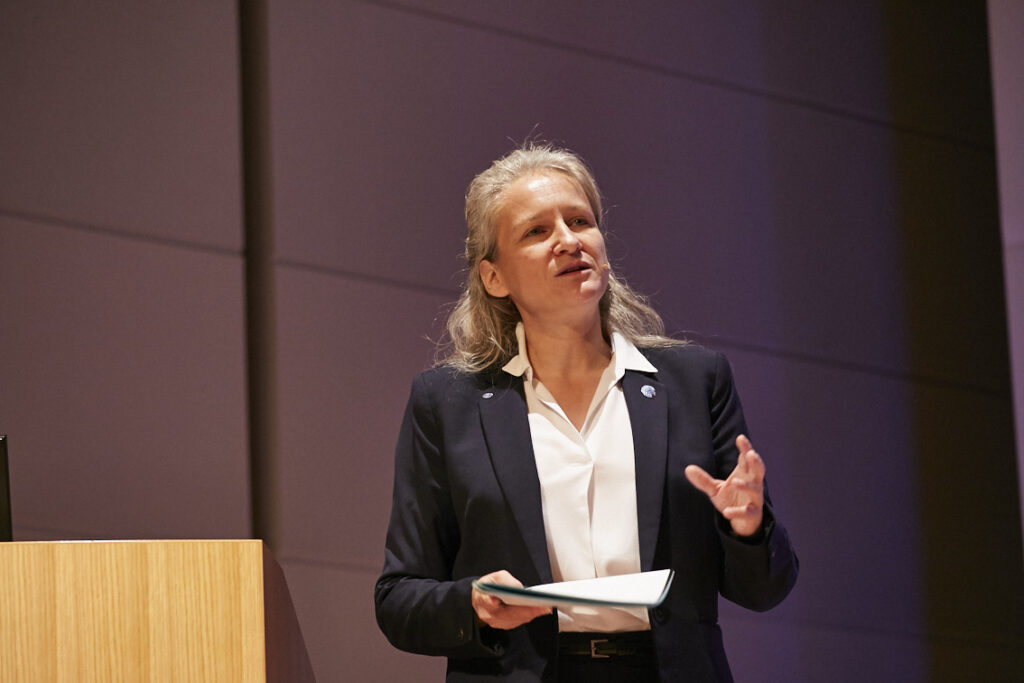
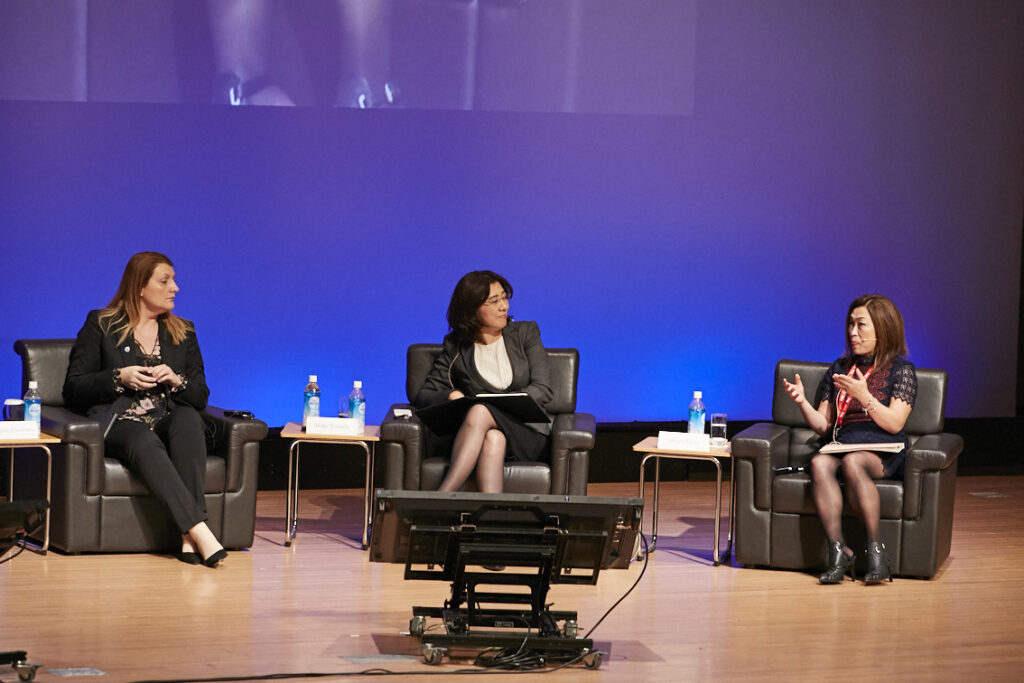
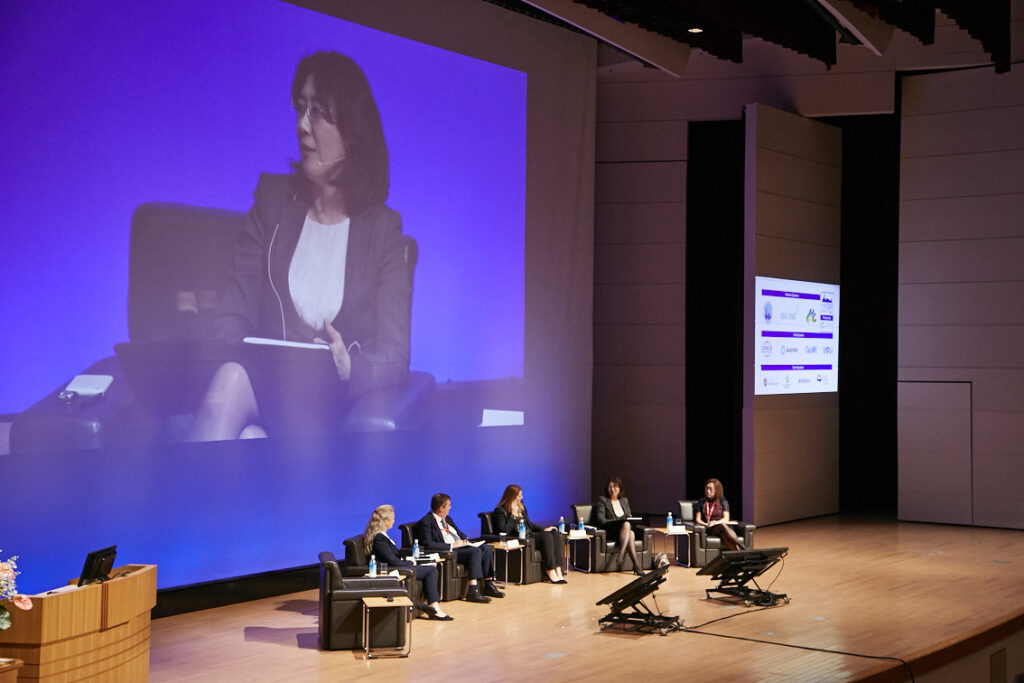
Session 3: IMO Regulations from Perspectives of Industrial Associations
Moderator: Guy Platten, Secretary General, International Chamber of Shipping (ICS)
Speakers:
Angus R. Frew, Secretary General & CEO, Baltic and International Maritime Council (BIMCO)
Katharina Stanzel, Managing Director, INTERTANKO
Tom Boardley, Secretary General, Cruise Lines International Association (CLIA)
Patrick Verhoeven, MD, Policy and Strategy, International Association of Ports and Harbors (IAPH)
On the topic of GHG countermeasures in international marine transport, Angus Frew from BIMCO assessed Japan’s vessel output regulation proposal as “a rational alternative” and cited “shortening standby time of vessels outside ports” as another method. He pointed out that the situation in which vessels arrive long before they are scheduled to unload their cargo to wait at anchor offshore is a cause of an increase of GHG emissions. Based on tests done at Port of Bremerhaven and Port of Rotterdam, it has been trial calculated that reducing vessels waiting offshore could lower their fuel costs by 20%. He explained his expectation, stating, “This is an ambitious project that cannot be successful without cooperation between ports and the marine transport industry, and the key to this is finding out how to provide incentives.”
Patrick Verhoeven of the IAPH pointed out that a hurdle to the reduction of GHG emmissions at ports is the cost of installing bunkering facilities for next-generation fuels. In Italy, port authorities have invested in onshore power-supply facilities, but he introduced cases which have been criticized because they have remained almost unused, and commented that, “Ports must carefully consider whether or not their customers truly require such facilities.”
Stanzel of INTERTANKO pointed out that in order to effectively reduce GHG, “it is important to share highly transparent data.” Frew stated that “Sharing of data in the aviation industry is ahead of that in the marine transportation industry,” then added, “We have to appropriately inform a wide range of people of the marine transportation industry’s efforts. We have many important stories to tell about the way marine transport is aiming for zero-emissions. Out industry is working to resolve many challenges including ballast water, underwater noise, plastics in the ocean, and so on, but we do not effectively publicize our efforts.” On this topic, Boardley of the CLIA said that the cruise industry will, as an industry familiar to ordinary citizens, “strive to become the showcase of marine transport.”
Stanzel mentioned problems concerning seamen. She asked, “As advanced automation and computerization of vessels and cybersecurity problems appear, is the present STCW treaty enough?” and commented that, “Cyber security problems are worsening particularly rapidly, and the IMO’s countermeasures cannot easily keep pace with them.” She called for rules to be created to deal with these issues by not only setting absolute standards, but by conducting an urgent discussion guided by “goal-based standards” that clarify goals and permit the selection of a method of achieving them from among many methods.
Borderley on the other hand, said, “I am concerned about divisions within the marine transport industry.” He cited the increase of regional regulations concerning ballast water management and SOx reduction and the division in arguments concerning carbon planning that Europe is promoting to issue the warning, “That which is most frightening is the emergence of countries and regions opposed (to the IMO). They will inevitably contravene the decisions of the IMO to take actions opposed to the direction the marine transport industry is moving.”
Patrick Verhoeven pointed out a problem concerning the European Commission, namely, “It tends to push ahead driven by simple slogans, but matters cannot be undertaken so simply. Time must be devoted to persuasion.”
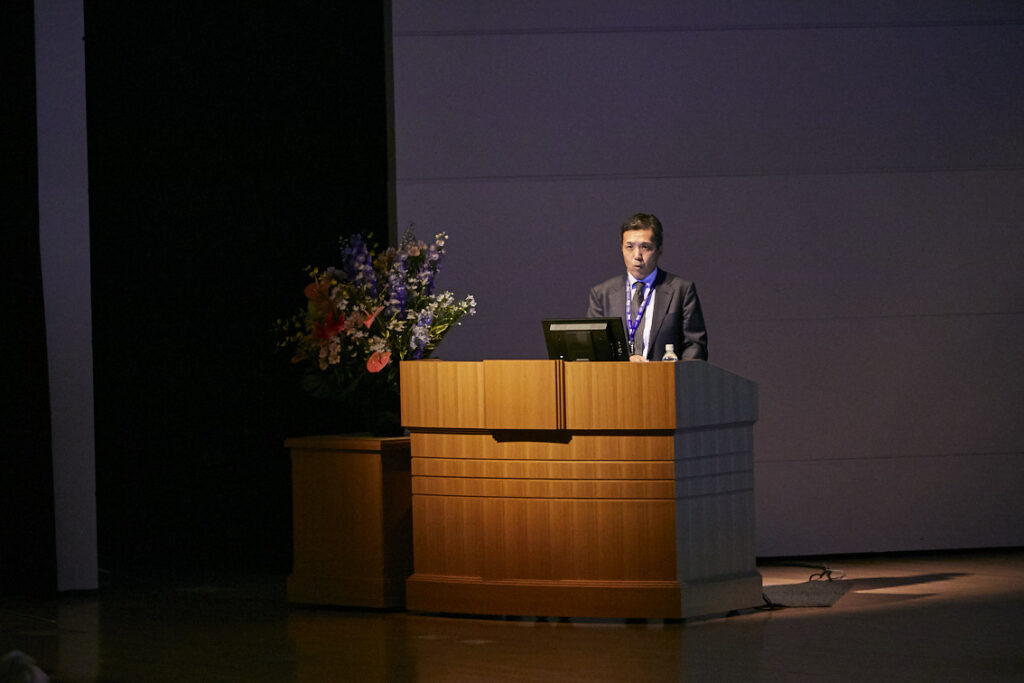
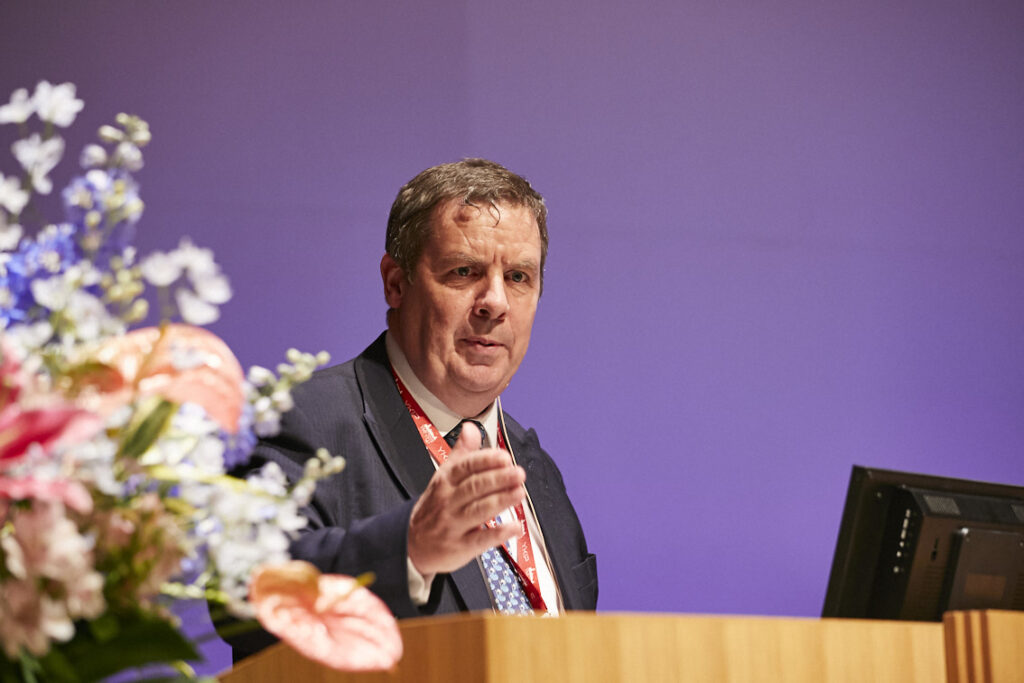
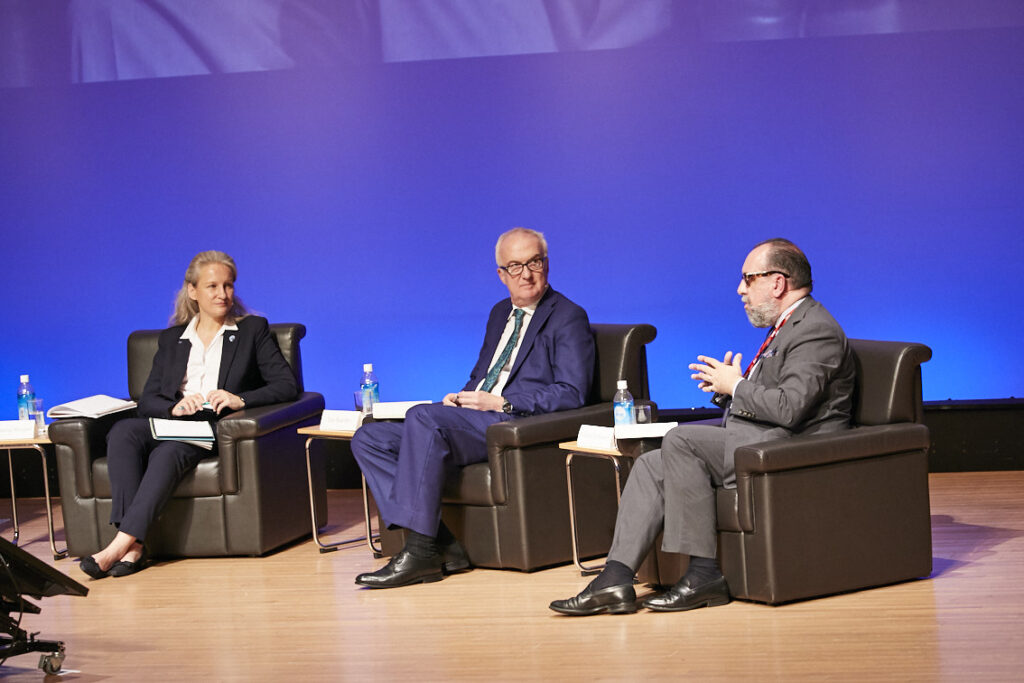
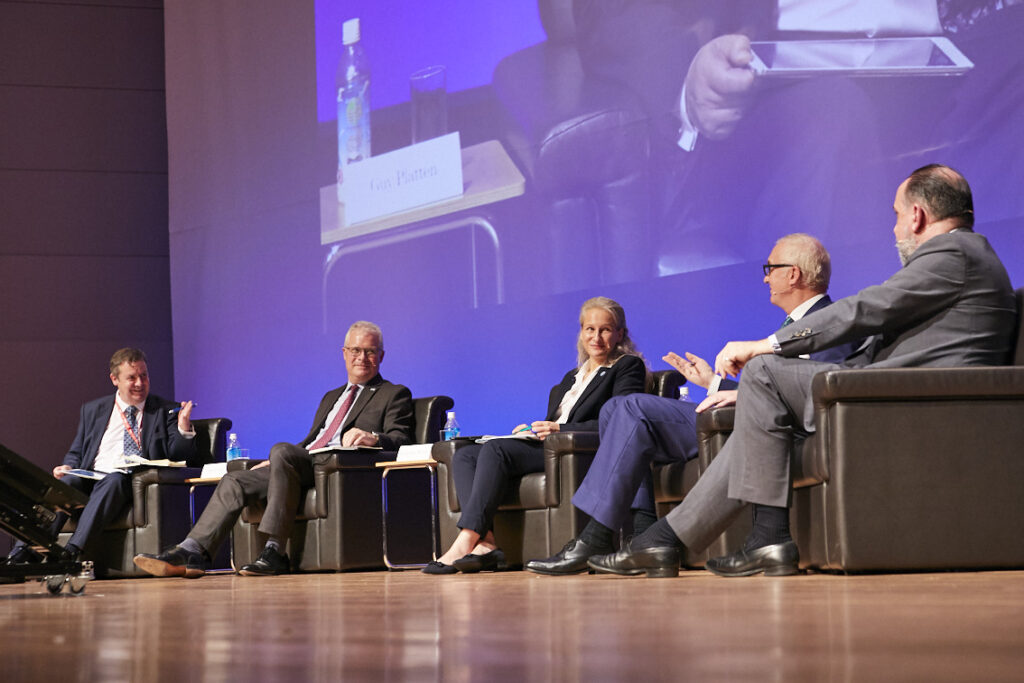
Port of Vancouver and Port of Yokohama have been the sister ports since May 15, 1981. Both ports have built a strong, productive friendship and collaborative relationship to promote the development of trade and commerce between the two ports and their regions. Both ports would like to take this day, at 38th anniversary of sisterhood, and 160th anniversary of Port of Yokohama as an opportunity to enhance our relationship, and to take it to the next level. The two ports signed a MOU, in order to advance environmental leadership within the port and shipping industry, on October 23, 2019.
In terms of the actions to be taken toward the climate change, the two ports have collaborated quite closely. Yokohama introduced Vancouver to SEA/LNG, one of the biggest organizations to promote LNG as marine fuel, and Vancouver introduced Yokohama to a program named World Ports Climate Action Program (WPCAP), a group of leading ports around the world who are determined to take actions on reduction of GHG emissions by working on five respective projects, including increasing efficiency, policy approaches, power-2-ship development, low-carbon maritime fuels development and decarbonizing cargo handling facilities.
Yokohama signed her declaration for membership of WPCAP on the same day, becoming the 13th addition to WPCAP.

From left to right,
Ms. Leslie Teramoto, Executive Director, Investor Service, BC Ministry of Jobs, Trade and Technology, Mr. Fazil Mihlar, Deputy Minister, BC Ministry of Jobs, Trade and Technology, Mr. Tracy Reynolds, Senior Trade Commissioner and Minister (Commercial), Embassy of Canada to Japan, Mr. Duncan Wilson, Vice President, Environment, Community and Government Affairs, Port of Vancouver, Mr. Ronan Chester, Manager, Strategic Environmental Initiatives, Environmental Programs, Port of Vancouver, Mr. Masamichi Morooka, President & CEO of YKIP, Mr. Shinsuke Itoh, Vice President of YKIP, Mr. Hisataka Uematsu, Director General for Policy Coordination, Port and Harbor Bureau City of Yokohama, Mr. Akimasa Ochiai, Executive Director, Port Promotion Department, Port and Harbor Bureau City of Yokohama, Ms. Sakura Kuma,Executive Director of YKIP

From left to right,
Ms. Imke Deibel, Advisor, Port of Rotterdam, Mr. Eric Van der Schans, Director of Environmental Management, Port of Rotterdam, Mr. Masamichi Morooka, President & CEO of YKIP, Mr. Duncan Wilson, Vice President, Environment, Community and Government Affairs, Port of Vancouver, Mr. Peter Alkema Policy Advisor, Port of Amsterdam, Chair of the IAPH CMF Working Group
As one of the kick-off events of London International Shipping Week (September 9-12), a panel discussion on “Do Ports Need International Regulation” was taking place at the headquarter of International Maritime Organization, co-organized by Hutchinson Ports and IMO.
Sakura Kuma, the Executive director of YKIP was invited to the panel. She argued that, before any implementation of international regulation, first of all it is important to address what differences really matter and what the ultimate goal should be, and then dialogues need to be in place not only among the ports but also all stakeholders. Solutions based on seeking for mutual benefit should be pursued sufficiently which haven’t been done yet. International regulation might be necessary when other disposals don’t work, in which the case, the challenges in terms of the implementation of international regulation need to be addressed and dealt with carefully.
Discussion also extended to the topic of diversity in the maritime industry.

From left to right, Guy Platten, Secretary General at ICS; Patrick Verhoeven, Managing Director Policy and Strategy at IAPH; Lamia Kerdjoudj-Belkaid, Secretary General at Federation of European Private Port Operators (FEPORT); Frederick J. Kenny Jr, Director of Legal and External Affairs at IMO; Sakura Kuma, Executive Director at YKIP; Diana Whitney, General Counsel at Hutchinson Ports; Andrew Higgs, Consultant Solicitor at Setfords Solicitors
【More detail about the event】http://www.imo.org/en/MediaCentre/WhatsNew/Pages/default.aspx
Yokohama Kawasaki International Port Corporation (YKIP), is honored to host Yokohama Maritime Forum 2019 in October 23-24, in celebrating the 160th anniversary of the Port of Yokohama, one of Japan’s largest maritime trading centers.
Focusing on “sustainability, diversity and harmonization”, YMF 2019 will challenge the maritime/port community to identify and discuss solutions to the global challenges of the 21st century, by inviting highly respected representatives from the maritime/port community including vessel owners and operators, port entities, maritime support services, LNG stakeholders, industrial associations, scholars and regulatory groups, to the panel discussions.
The panel discussions will be dedicated to topics such as environmental challenges, gender balance and diversity, LNG as marine fuel, pollution in (not only the air but also) the sea and its governance.
Searching for solutions requires certain level of harmonization as well. Harmonization is critical for cooperation between port and maritime communities, synergy of technology innovation and commercial demands, balancing the global commitment and business sustainability.
YMF2019 will offer tremendous opportunities of networking, exposure of your brand to the Asian region. Plus, it is held just between quarter-final and semi-final games of the 2019 Rugby World Cup. We anticipate an informative and rewarding experience for all attendees.
Every exciting thing about YMF2019 is now online. Early bird rate for registration is available until September 22, come and join us in Yokohama.
https://www.ymf2019.com/
YKIP delegation visited Evergreen Line headquarters in Taiwan on June 28, 2019.
The top management of Evergreen warmly welcomed YKIP delegation. Evergreen stressed the importance of Japanese market and Port of Yokohama for their liner network and appreciated the cooperation and assistance by YKIP.

From left to right: Winson Chen(Deputy Manager, Evergreen), Louis Wan (Deputy Junior Vice President, Evergreen), Sakura Kuma(Executive Director, YKIP), Masamichi Morooka(President & CEO, YKIP), Wilson Yeh (Deputy Senior Vice President, Evergreen), Shinsuke Ito (Vice President, YKIP), Ryoji Kudo (General Manager, YKIP)
Sakura Kuma, Executive Director of YKIP, talked about Port of Yokohama as well as LNG bunkering project during an interview when participating the 5th International LNG Congress (29-30th, April 2019) in Malta.
YKIP has joined World Ocean Council since January 2019.
World Ocean Council is a global, cross-sectoral ocean industry leadership alliance committed to “Corporate Ocean Responsibility”, developed by and for the private sector, with a unique and multi-sectoral approach to address cross-cutting issues affecting ocean sustainable development, science and stewardship of the seas.
Members are from corporations, Industry and Trade Associations, Research, Academic and Scientific Institutions and individuals from around the world.
Vessel emissions are not the only challenge, pollution of our oceans, a critical natural resource, are primarily generated from land-based activities including manufacturing, lifestyle related behaviors or natural disasters. Garbage in the ocean, plastic among the worst, and its impact to the global Eco-system is a shared responsibility of our global society that requires urgent attention.
YKIP is determined to enhance networking with related parties to make a difference and to exemplify leadership in ocean sustainability.
【Link】https://www.oceancouncil.org/
ICS, BIMCO, INTERTANKO and WISTA, with the support of the International Maritime Organisation (IMO), co-organized a panel discussion on this year’s World Maritime Day theme of “Empowering Women in the Maritime Community”, at IMO’s London headquarters on 1 May 2019.
Following the opening speech addressed by Lim Kitack, Secretary General of IMO, five women who are representing shipowner, port, regulator, industrial association and maritime services each participated this panel, sharing their life stories and advices on equal rights and opportunities of the maritime community.
Sakura Kuma, the Executive Director of YKIP, represented voices from port sector as well as Asia.

From left to right: Guy Platten (Secretary General of ICS, the moderator), Sakura Kuma (Executive Director of YKIP), Capt.Fran Collins (CEO of Red Funnel Group), Katy Ware (Director of Maritime Safety and Standards at UK Maritime Coastguard Agency), Despina Theodosiou (CEO of Tototheo Maritime and President of WISTA International) and Katharina Stanzel (Managing Director of INTERTANKO) , Kitack Lim (Secretary General of IMO).
On April 30, 2019, Masamichi Morooka, President & CEO of YKIP, was invited to join a panel of the 5th International LNG Congress in Malta.
As addressed at the opening speech by Joe Mizzi, the Minister of Energy and Water Management of Malta, stated that the increase of demand for LNG as a marine fuel In Mediterranean is highly expected, which is also a part of the reason that the congress was held in Malta for the very first time.
As respectfully requested, Morooka explained the LNG bunkering development at Port of Yokohama, and he also presented a newbuild of LNG bunkering vessel recently placed an order with Japan Marine United Corp. by Ecobunker Shipping, which is a joint venture of Sumitomo Corp., Uyeno Transtec Ltd. and YKIP.
